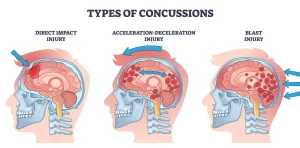Overview
Diagnosis
To diagnose a concussion, a healthcare professional evaluates symptoms, reviews medical history, and may order specific tests. Common assessments include a neurological exam, cognitive testing, and imaging studies.
Neurological exam
This involves detailed questions about the injury followed by tests to check:
-
Vision
-
Hearing
-
Strength and sensation
-
Balance and coordination
-
Reflexes
Cognitive testing
Cognitive tests evaluate mental functions such as:
-
Memory
-
Concentration
-
Ability to recall information
Imaging tests
Brain imaging is done when symptoms such as severe headaches, seizures, or vomiting are present, or when symptoms worsen.
-
CT scan is the standard test in adults to detect bleeding or swelling in the brain.
-
MRI may be used later to identify brain changes or complications.
-
Children receive CT scans only if necessary to avoid excess radiation exposure.
Observation
After diagnosis, observation may occur in a hospital or at home. Someone should monitor the person for at least 24 hours to ensure symptoms do not worsen.
Treatment
Treatment focuses on rest, gradual recovery, and symptom management.
Physical and mental rest
-
Rest for the first 1–2 days to allow brain recovery.
-
Avoid activities that worsen symptoms, such as screen time, reading, or studying.
-
Refrain from sports or physical exertion until symptoms improve.
-
After initial rest, gradually resume activities that don’t trigger symptoms.
Gradual return to activity
-
Slowly increase mental and physical tasks as symptoms improve.
-
Healthcare professionals may suggest shorter work or school days.
-
A structured, stepwise return-to-sport plan ensures safe recovery before resuming contact activities.
Pain relief
-
Headaches can be managed with acetaminophen (Tylenol).
-
Avoid ibuprofen or aspirin, as they may increase bleeding risk.
Rehabilitation
Therapies may be recommended for ongoing problems with balance, vision, or memory to support full recovery.
Advertisement

